Garden Fencing Central London
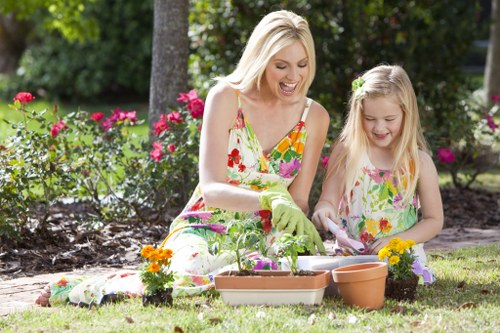
Creating a beautiful and secure garden space in Central London requires thoughtful planning and the right garden fencing. Whether you’re looking to enhance privacy, add aesthetic appeal, or protect your plants, choosing the perfect fence is essential.
Central London offers a variety of garden fencing options to suit different tastes and requirements. From classic wooden panels to modern metal designs, there’s something for every garden style. Understanding the available materials and styles can help you make an informed decision.
Moreover, professional installation ensures that your garden fence not only looks great but also stands the test of time. Skilled installers in Central London are familiar with local regulations and can provide valuable advice tailored to your specific needs.
Types of Garden Fencing
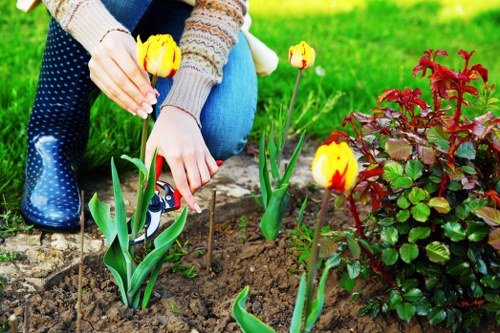
When selecting a garden fence, it’s important to consider the type that best fits your garden's style and your functional needs. Here are some popular options available in Central London:
Wooden Fencing
Wooden fences are a timeless choice, offering a natural and warm aesthetic. They can be customized in various heights and styles, from traditional picket fences to more modern horizontal slats.
Metal Fencing
Metal fences, such as wrought iron or aluminum, provide durability and a sleek look. They are low-maintenance and can be designed with intricate patterns to add a touch of elegance to your garden.
Vinyl Fencing
Vinyl fences are a practical option, known for their longevity and ease of maintenance. They come in different colors and styles, offering a versatile solution for many garden designs.
Benefits of Garden Fencing
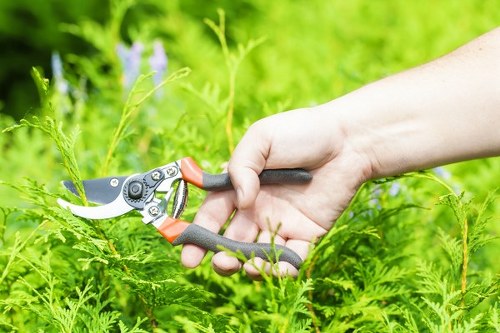
Installing a garden fence offers numerous benefits beyond just defining boundaries. Here are some key advantages:
Privacy and Security
A sturdy fence can provide much-needed privacy, creating a secluded space for relaxation. It also acts as a deterrent against unwanted intrusions, enhancing the security of your property.
Aesthetic Appeal
Well-designed fencing can significantly enhance the visual appeal of your garden. It adds structure and can complement the overall garden theme, making your outdoor space more inviting.
Protection for Plants
Fences can protect your garden from pets, pests, and harsh weather conditions, ensuring that your plants thrive. They create a barrier that keeps out unwanted visitors, preserving the beauty of your garden.
Choosing the Right Material
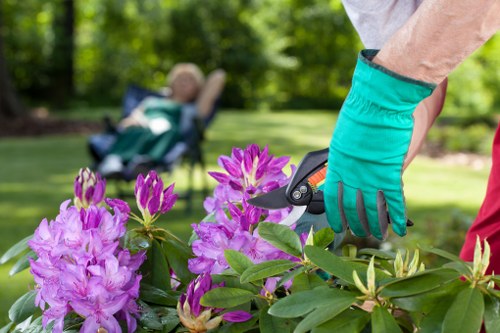
Selecting the right material for your garden fence is crucial for both functionality and appearance. Consider the following factors:
Durability
In Central London’s climate, it’s important to choose materials that can withstand varying weather conditions. Metal and vinyl fences are known for their durability, while wooden fences may require regular maintenance.
Maintenance
Different materials require different levels of upkeep. Vinyl and metal fences are generally low-maintenance, whereas wooden fences may need periodic painting or staining to keep them looking their best.
Cost
Budget is always a consideration. Wooden fences can be more affordable initially but may incur higher maintenance costs over time. Metal and vinyl fences might have higher upfront costs but offer long-term savings due to their durability.
Installation Process
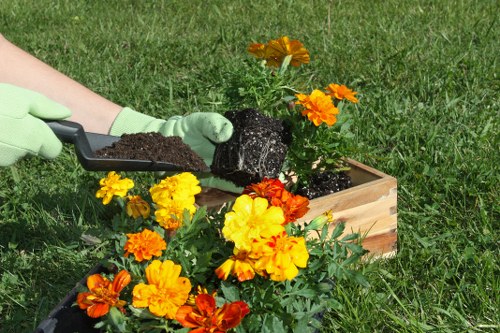
Proper installation is key to ensuring the longevity and functionality of your garden fence. Here’s what to expect:
Planning and Measurement
Accurate measurement of your garden space is essential. Professional installers will consider the layout, existing structures, and any local regulations before beginning the installation.
Preparation
The installation area needs to be prepared by clearing any obstructions and ensuring a stable foundation. This step is crucial for the fence’s stability and durability.
Installation
Skilled installers will assemble and erect the fence according to the chosen design. They will ensure that all panels are level and securely fixed, providing a neat and sturdy finish.
Final Touches
Once the fence is installed, final touches such as trimming excess materials and adding decorative elements can be done to enhance the overall appearance of your garden.
Maintenance Tips
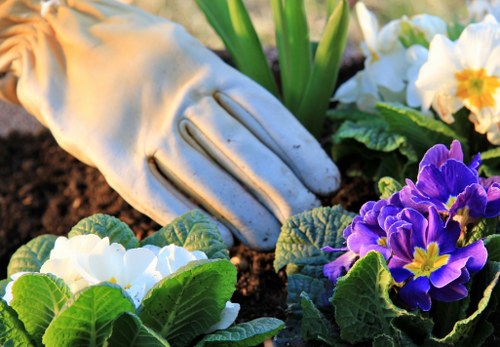
Maintaining your garden fence ensures it remains in good condition and continues to serve its intended purpose. Here are some maintenance tips:
Regular Cleaning
Periodically clean your fence to remove dirt, debris, and any signs of wear. This is especially important for wooden fences, which may be more susceptible to environmental damage.
Inspect for Damage
Regularly inspect your fence for any signs of damage, such as cracks, rust, or loose panels. Addressing these issues promptly can prevent more extensive damage down the line.
Repainting and Staining
If you have a wooden fence, repainting or staining can help protect it from the elements and keep it looking fresh. This should be done every few years, depending on weather exposure.
Cost Considerations

Understanding the costs involved in installing a garden fence can help you budget effectively. Here are some key factors that influence the overall cost:
Material Costs
The type of material you choose significantly impacts the cost. Wooden fences are generally more affordable, while metal and vinyl fences tend to be pricier but offer greater durability.
Size and Length
The size and length of your garden fence will affect the total cost. Larger gardens require more materials and labor, increasing the overall expense.
Design Complexity
Intricate designs with detailed patterns or custom features can add to the cost. Simple, straightforward designs are more cost-effective and easier to install.
Installation Fees
Professional installation fees vary based on the complexity of the project and the rates of the installers. Getting multiple quotes can help you find a competitive price.
Local Regulations and Permits
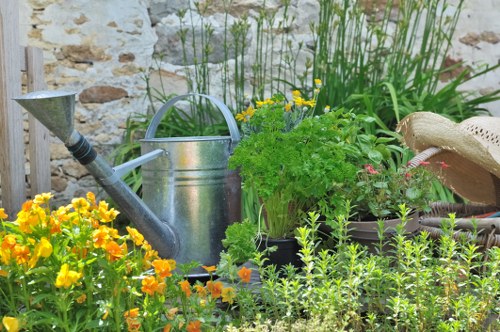
Before installing a garden fence in Central London, it’s important to be aware of local regulations and permit requirements. Here’s what you need to know:
Planning Permissions
In some cases, especially for high fences or those in conservation areas, you may need planning permission from the local council. It’s essential to check with your local authority before proceeding.
Height Restrictions
There are often height restrictions for garden fences, particularly in residential areas. Ensuring your fence complies with these limits can save you from potential fines or the need to modify your fence later.
Boundary Laws
If you share a boundary with a neighbor, there may be specific rules regarding the type and placement of fences. It’s a good practice to discuss your plans with your neighbors to avoid any disputes.
Listed Buildings and Conservation Areas
Special rules apply to listed buildings and properties within conservation areas. Any modifications or additions, including garden fences, may require additional permissions to preserve the area’s historical and architectural integrity.
Choosing a Professional Installer
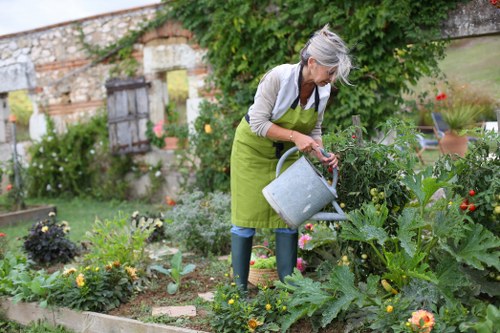
Hiring a professional installer for your garden fence ensures quality workmanship and adherence to local regulations. Here are some tips for choosing the right installer in Central London:
Experience and Expertise
Look for installers with extensive experience in garden fencing. Their expertise will ensure that your fence is installed correctly and meets your expectations.
Reputation and Reviews
Check online reviews and ask for references to gauge the installer’s reputation. Positive feedback from previous clients is a good indicator of reliable service.
Licensing and Insurance
Ensure that the installer is properly licensed and insured. This protects you in case of any accidents or damages during the installation process.
Transparent Pricing
Choose an installer who provides clear and transparent pricing. A detailed quote helps you understand the cost breakdown and avoid any hidden fees.
Warranty and Aftercare
Opt for installers who offer warranties or aftercare services. This provides peace of mind, knowing that any issues post-installation will be addressed promptly.
10-15 Closest Areas to Central London
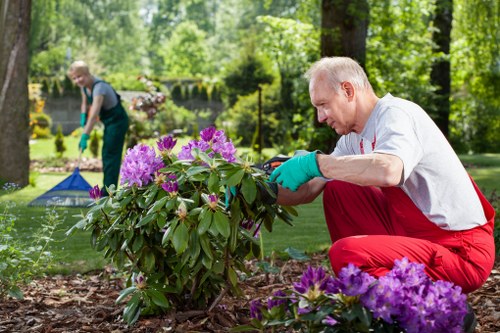
Central London is surrounded by numerous vibrant areas, each offering unique features and proximity that make them ideal for garden fencing projects. Here are some of the closest areas to Central London:
- Kensington: Known for its elegant homes and lush gardens, Kensington is a prime area for stylish and sophisticated garden fencing solutions.
- Camden: A lively area with diverse architectural styles, Camden offers a range of fencing options to complement its eclectic environment.
- Islington: With its mix of modern and traditional properties, Islington is perfect for those seeking versatile fencing designs.
- Greenwich: Rich in history, Greenwich provides opportunities for classic and heritage-inspired fencing styles.
- Shoreditch: A trendy district, Shoreditch is ideal for contemporary and artistic fencing designs that make a statement.
- Westminster: Central to London’s landmarks, Westminster requires elegant and secure fencing solutions for high-profile properties.
- Chelsea: Known for its chic residences, Chelsea is suited for high-end fencing materials and bespoke designs.
- Marylebone: This upscale area appreciates sophisticated and refined fencing options that enhance garden elegance.
- Hampstead: With its spacious gardens, Hampstead benefits from robust and aesthetic fencing to match its serene environment.
- Notting Hill: Famous for its vibrant community, Notting Hill is great for colorful and creative fencing styles.
- Battersea: Combining modern and traditional elements, Battersea is suitable for a variety of fencing materials and designs.
- Soho: A bustling area, Soho requires stylish and durable fencing to withstand the urban setting.
- Brixton: Known for its cultural diversity, Brixton offers opportunities for unique and personalized fencing designs.
- Mayfair: As one of the most prestigious areas, Mayfair demands high-quality and luxurious fencing solutions.
Enhancing Your Garden with Fencing
A well-chosen fence can transform your garden into a private oasis or a stunning showcase space. Here are some ideas to enhance your garden with fencing:
Vertical Gardens
Using your fence as a support for vertical gardens can add greenery and life to your outdoor space. It’s a great way to maximize space and create a lush environment.
Decorative Panels
Incorporate decorative panels or lattice work to add texture and visual interest to your fence. These elements can also serve as partial privacy screens while allowing light to filter through.
Lighting Integration
Installing garden lighting along your fence can enhance the ambiance in the evening. It highlights the fence’s design and provides safe pathways in your garden.
Climbing Plants
Planting climbing vines or flowers on your fence can soften its appearance and integrate it naturally into your garden landscape.
Seating and Fixtures
Adding built-in seating or fixtures like birdhouses and planters can make your fence a functional and attractive part of your garden.
Choosing Colors and Finishes
The color and finish of your garden fence play a crucial role in complementing your garden’s overall theme. Here’s how to choose the right colors and finishes:
Complementary Colors
Select colors that complement your garden’s palette. Neutral tones like white, beige, or natural wood shades often work well, but bold colors can make a striking statement.
Matching Existing Structures
Ensure that your fence color harmonizes with existing structures such as your house, garden furniture, and plantings. This creates a cohesive and unified look.
Weather-Resistant Finishes
Choose finishes that are resistant to weathering, especially in London’s variable climate. Powder-coated metals or treated woods can help maintain the fence’s appearance over time.
Accents and Highlights
Incorporate accent colors or highlights to add depth and interest. This could be achieved through painted details, trim, or mixed materials.
Temporary Options
If you prefer flexibility, consider temporary finishes that can be updated or changed as your garden evolves. This allows you to experiment with different looks without commitment.
Eco-Friendly Fencing Options
For environmentally conscious gardeners, eco-friendly fencing options are available that minimize environmental impact. Here are some sustainable choices:
Recycled Materials
Fences made from recycled materials, such as reclaimed wood or recycled metal, reduce waste and promote sustainability. These options contribute to a greener garden.
Bamboo Fencing
Bamboo is a renewable resource that offers a unique and natural look. It’s lightweight, durable, and provides a sustainable alternative to traditional fencing materials.
Composite Fencing
Composite fences combine wood fibers with recycled plastics, offering the appearance of wood with enhanced durability and lower environmental impact.
Solar-Powered Lighting
Integrating solar-powered lighting into your fence design reduces energy consumption and promotes eco-friendly gardening practices.
Non-Toxic Finishes
Choose non-toxic finishes and treatments to protect your fence without harming the environment. These options are safer for plants and wildlife in your garden.
Maximizing Privacy
Privacy is often a key consideration when installing a garden fence. Here’s how to maximize privacy in your garden:
Height and Density
Choosing a taller fence or one with closely spaced panels can significantly increase privacy by blocking the view from neighbors and passersby.
Hedging and Plants
Planting hedges or tall shrubs alongside your fence can enhance privacy while also adding greenery and life to your garden.
Solid Panels
Opt for solid fencing panels without gaps to prevent visibility through the fence. This ensures complete privacy and a seamless look.
Lattice Inserts
If you prefer some openness, lattice inserts can provide partial privacy while still allowing light and air to flow through your fence.
Decorative Screens
Adding decorative screens or decorative elements to your fence can obscure views while also enhancing the aesthetic appeal of your garden.
Enhancing Security
While privacy is important, security is another critical aspect of garden fencing. Here are ways to enhance security:
Sturdy Materials
Choose strong and durable materials like wrought iron or reinforced wood to deter potential intruders and provide a secure barrier.
Locking Gates
Install secure locking gates to control access to your garden. High-quality locks ensure that only authorized individuals can enter.
Height and Visibility
Taller fences and those with limited visibility make it harder for intruders to enter unnoticed. This added layer of security can protect your property effectively.
Surveillance Integration
Incorporate surveillance cameras or motion-sensor lighting near your fence to monitor and deter suspicious activities around your garden.
Reinforced Posts
Using reinforced posts and secure anchoring techniques prevents the fence from being easily climbed or damaged, enhancing its security function.
Conclusion
Choosing the right garden fencing in Central London involves considering factors like material, design, functionality, and local regulations. A well-designed fence not only enhances the beauty and privacy of your garden but also provides security and protection for your outdoor space.
By understanding the various fencing options and working with professional installers, you can create a garden that reflects your personal style and meets your practical needs. Whether you prefer classic wooden fences or modern metal designs, the right fence can transform your Central London garden into a stunning and secure haven.
Investing in quality materials and regular maintenance ensures that your garden fence remains a valuable asset for years to come, adding both aesthetic and functional value to your home.
Frequently Asked Questions
1. What is the best material for garden fencing in Central London?
The best material depends on your specific needs and preferences. Wooden fences offer a classic look, metal fences provide durability and security, while vinyl fences are low-maintenance and versatile. Consider factors like budget, maintenance, and desired aesthetic when choosing the material.
2. Do I need planning permission for installing a garden fence in Central London?
In some cases, especially for taller fences or those in conservation areas, planning permission may be required. It’s advisable to check with your local council before installing a fence to ensure compliance with local regulations.
3. How much does it cost to install a garden fence in Central London?
The cost varies based on the type of material, size of the garden, and complexity of the design. On average, prices can range from £50 to £150 per meter. Getting multiple quotes from professional installers can help you find a competitive price that fits your budget.
4. How do I maintain my garden fence?
Regular maintenance includes cleaning, inspecting for damage, and repairing any issues promptly. Wooden fences may require periodic painting or staining, while metal and vinyl fences typically need less upkeep. Ensuring that your fence is in good condition will extend its lifespan and keep it looking its best.
5. Can I install a garden fence myself?
While it is possible to install a fence yourself, hiring a professional installer is recommended to ensure the job is done correctly and complies with local regulations. Professional installation also saves time and ensures that your fence is sturdy and secure.